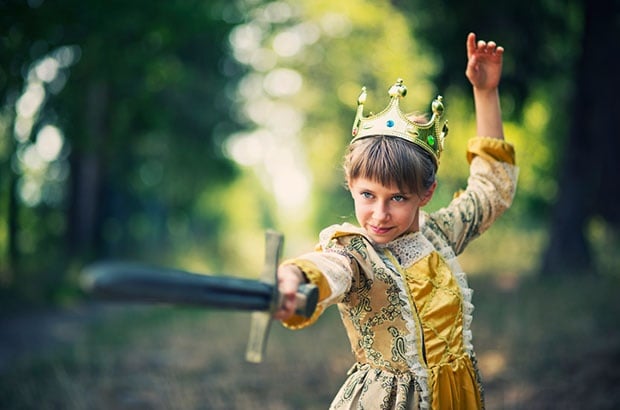
In most everything I do these days, I try to be as unapologetically politically correct as possible.
So I must confess that I often try my utmost to gasp at every assumption that I can whip up a batch of cupcakes with nothing but my dainty hands and feminine instinct and I’d prefer high heels over sneakers, princesses over dragons and monsters.
Truth is though, pink is my favourite colour and when Harry married Meghan my eyes were glued to the TV screen and nothing and no-one was going to pull me away from the royal wedding. I wrote it off as a personal day.
I am no less obsessed with princesses today as I was when I was little. And as forward-thinking as I want today's girls to be growing up, I'm okay that they too get excited by anything sparkly and Frozenesque. Is that really such a bad thing?
Can’t I have my feminism and eat it too?
The trouble with those damsels in distress
Michelle Smith, a research fellow at Deakin University, wrote in ‘The royal wedding and the lure of the princess myth’ that the reason many of us feminists have trouble embracing the idea of little girls becoming princesses, is because of the traditional definition of what a princess is or what she’s become as a result of our collective cultural fantasies.
And Disney has also grabbed the opportunity to profit off the worldwide sensation that is the princess culture, which makes it all the more spellbinding for our little girls.
But Smith continues, “Today’s girls are enamoured of fairy tale princesses, with the spell of puffy dresses and plastic tiaras inspiring gendered apartheid in toy store aisles.
“Concerned parents and feminists find much to dislike in the pastel merchandising avalanche. They point to the predominant whiteness of princess culture – Disney only devised its first African American princess in the film The Princess and the Frog in 2009 – and the reinforcement of a passive feminine ideal. After all, it is a defining feature of the fairytale princess that she lies in wait for her prince.”
- Also read: No, sleeping beauty isn't sending the wrong message about consent – why we shouldn’t ban fairytales
From Snow White to Meghan Markle
But we seem to have come a long way from Walt Disney Studios’ first ever fully animated feature film, Snow White and the Seven Dwarves in 1937, which sees a princess as a scullery maid for her stepmother, only to escape and play housekeeper for a group of dwarves before a prince, the hero, comes along on his noble steed. Oh, and her skin was as white as snow.
Fast-forward to 2018, and the new Ralph Breaks The Internet: Wreck-It Ralph 2 trailer pokes fun at the dated fairytale script:
But we didn’t have to wait until 2018 to see some sort of restructuring of the script and adaptation from submissive princess to princess with big dreams. There was Pocahontas (1995) – the daughter of an Algonquin chief who brings peace to her community – and Mulan (1998), who dresses as a man to enlist in the Chinese army in place of her sickly father.
Frozen (2013) also saw two sisters in leading roles, supporting and depending on each other before leading all of Arendelle. And then, of course, there’s Moana – a princess and one of the inhabitants of a small Polynesian island called Motunui who is expected to take over from her father as the next chief. But Moana feels there’s something more out there for her, and there is: saving her land and her people form a terrible curse that sees her embarking on a journey across the seas.
So the princesses displayed on lunchboxes and filling those toy aisles today aren’t scrubbing floors and waiting for men to whisk them away. It’s quite the opposite, in fact: sisters are saving entire lands and looking and acting a lot like real-life princesses.
Let’s not forget that Meghan Markle was an actress, activist and full-time feminist long before she met her prince.
So is it okay that our kids are so obsessed with princesses? Absolutely. Gone are the days of scullery maids and having to be rescued from tall, tall towers. Today’s princesses are more like leaders than submissive servants, and more like full-time heroes than damsels in distress.
Are your kids also caught up in the whole princess phenomenon? Who are some of their favourite princesses? Tell us by emailing chatback@parent24.com and we may publish your comments on the site.
Read more:
- 10 modern-day heroes that are inspiring our kids
- Ever wondered what comes after happily ever after? This artist turned Disney characters into parents and got it spot on
- Disney encourages girls to dream big
Sign up to our weekly newsletter to receive Parent24 stories directly to your inbox.




 Publications
Publications
 Partners
Partners














